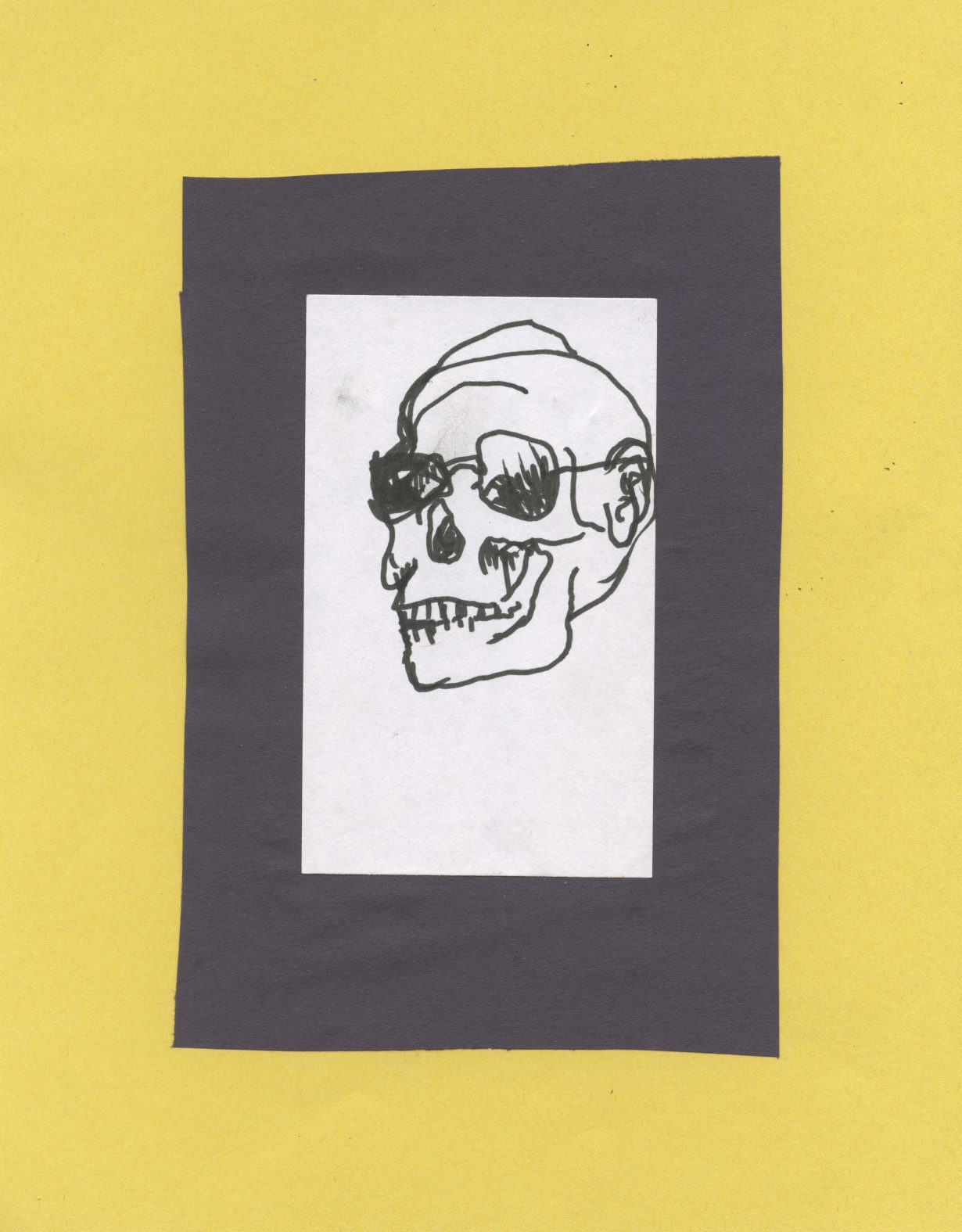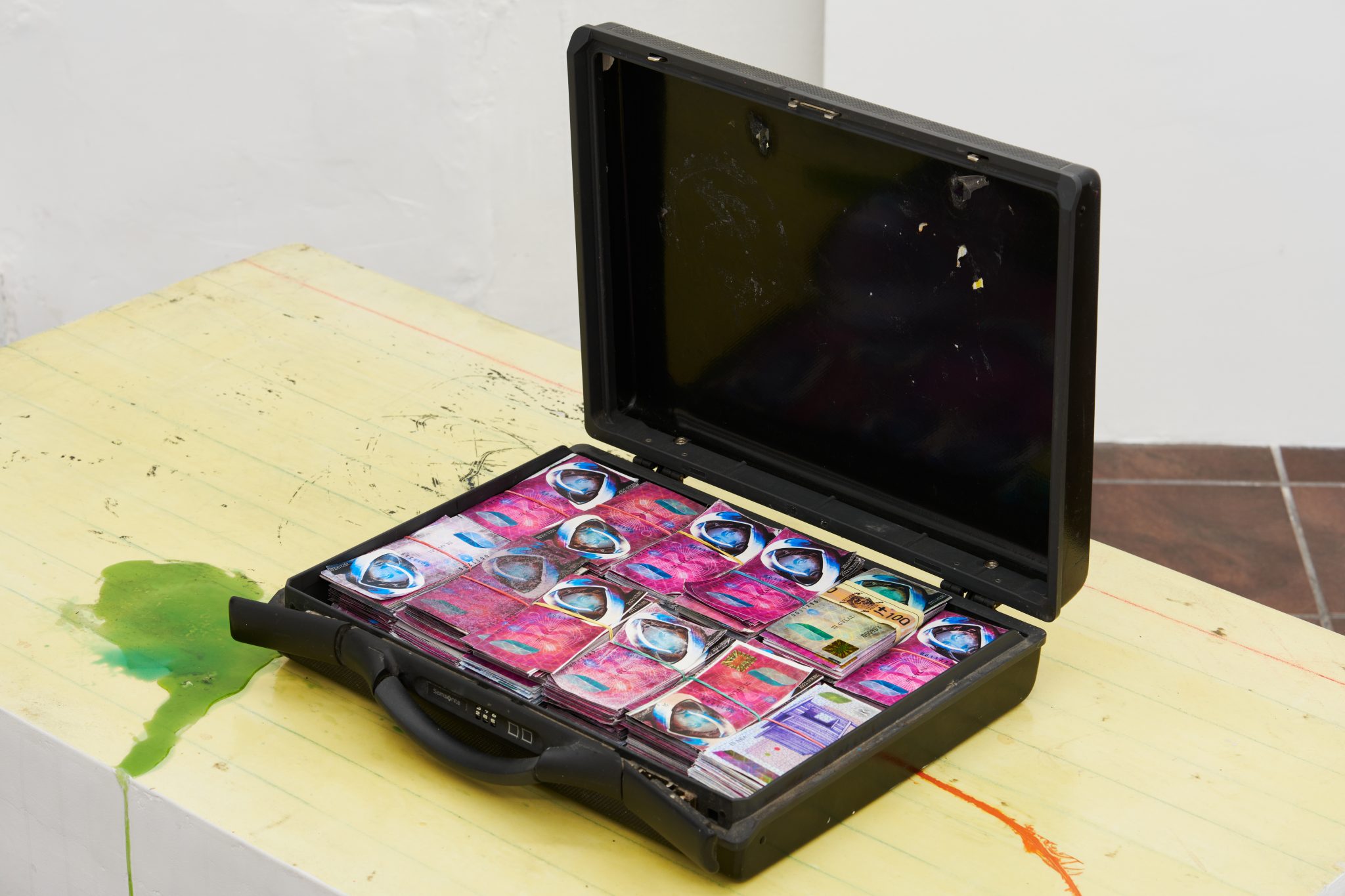Turning Tables at Timeshare, Los Angeles rails against the businessification of art
Eric Wesley has set up shop at Timeshare. A Samsonite black briefcase full of cash greets viewers at the Los Angeles artist’s solo exhibition. Staged on a table as if in the back room of a casino in a mob movie, the cash is organised in stacks and bound with rubber bands. Upon closer inspection, the purple bills seem to be two pieces of printer paper pasted together and illustrated with what looks like a Classical Greek bust in an astronaut helmet. This cash is not only a work – titled Timbuktu Money Case (all works 2024) – but a functioning currency invented by the artist. If purchased, the artworks in the show must be paid for in so-called Timbucks (aka ‘Timbuktu cash’), which have a conversion rate of 6.66 Timbucks to 9.99 US dollars.
The artworks in question include three wooden parallelepipeds. Two of them stand like tilted monoliths about the height of a typical gallery plinth, one lies horizontally like a coffee table. With five exposed surfaces, these versatile, ‘turn’-able tables are purposefully provisional in appearance, unpolished and unfussy (at the opening, they wobbled when guests leaned on them). Their surfaces are painted in loose strokes: one has a lined yellow surface like an index card and is covered in drips of acrylic paint sealed in resin and ink, and a pat of green slime. One, titled Working Model, seems to bear the stain of an oversize coffee mug – a reddish, impastoed ring of paint layered on a variegated, but mostly black, surface. On the back of another – Floor Sample Model – is the painting of an oyster.
Wesley’s show is arranged like a showroom, as if to parody the kind of contemporary art/design hybrid space that showcases ‘custom artist furniture’ and charges a small fortune for it. Each sculpture has a label with a serial number, a company name (‘Standard Modeling’) and the artist’s address and phone number. Aside from the briefcase of Timbucks, the tables display five similarly labelled binders of Wesley’s drawings on index cards, each card in a plastic sleeve and available for 66.66 Timbucks. Most of the cards feature doodles and scribblings, some contain as little as one line drawn in pencil, a splatter of pen ink or nothing at all, but others include obscure, handwritten aphorisms. (One reads: ‘Metro Pictures Gallery Conspired w/ China to Ruin Me’, likely referencing the time China Art Objects, Wesley’s LA gallery during the early 2000s, arranged a show for him at New York’s Metro Pictures, where he purportedly overdrank and was repudiated for damaging gallery property.)

Wesley’s ambitions often extend beyond art objects and beyond the gallery, to engage the institutional, corporate and economic structures and apparatuses imposed upon working artists. This is not the first time Wesley has created a mock business, to undermine the gallery system with irreverence and wit. In 2019, at the Art Los Angeles Contemporary fair, instead of showing a specific body of work, Wesley set up a wood-panelled administrative office in Bortolami Gallery’s booth. The office contained a desk with some objects he had made and others that he had collected, a green bank teller lamp and a small ceramic bust of George Washington among them. The work being sold therein, for a sum of $1 million, was the artist’s entire estate. (At the time of writing, the estate remains for sale.)
At a moment when so much of the artworld is professionalised and the contemporary artist’s studio is expected to double as a small business, Wesley turns the tables on his clients. With his funny money, the artist upends the stereotypical dynamic between the penniless artist and the philanthropic collector. By creating his own economic system, Wesley asserts his refusal to participate in this tired, imbalanced exchange and, in turn, entices potential patrons to participate in his world rather than him having to participate in theirs.
Turning Tables at Timeshare, Los Angeles, 19 July – 10 August
